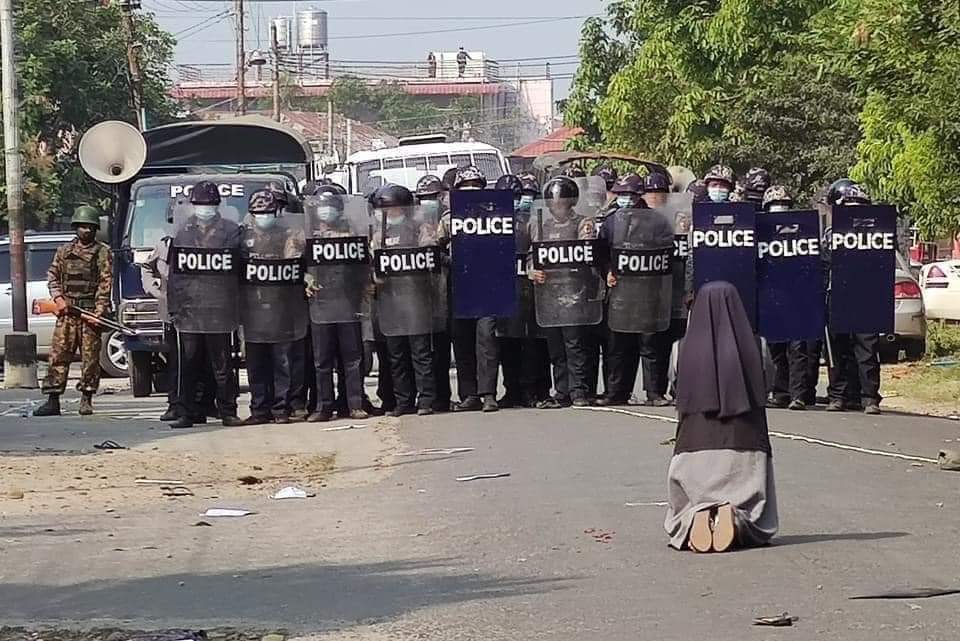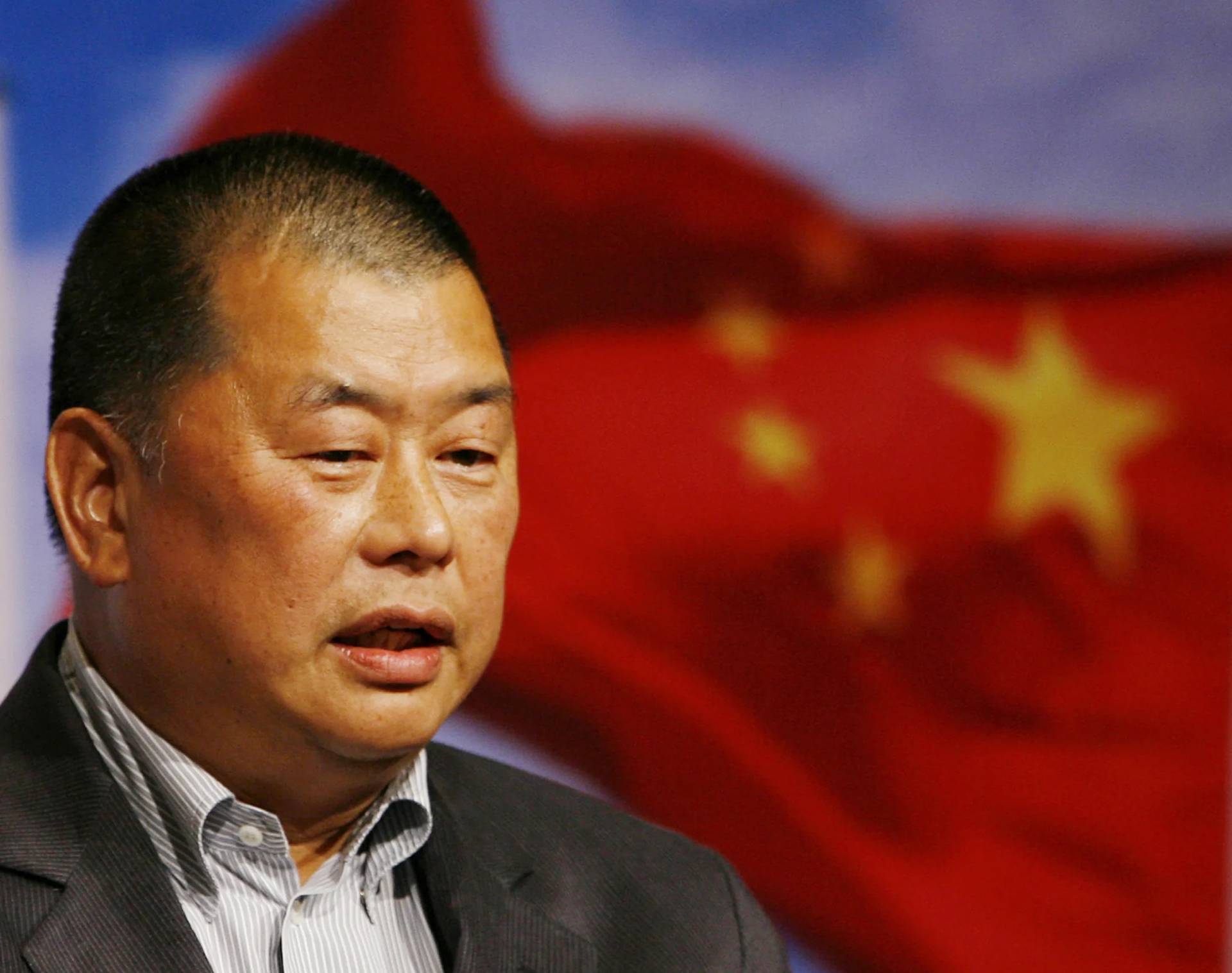ROME – On Sunday, Myanmar had its own “Tiananmen moment” when a Catholic nun stopped military forces from advancing on protesters by dropping to her knees and pleading with them to refrain from making arrests and resorting to violence.
The scene was reminiscent of the June 5, 1989, images of a lone man blocking a path of tanks in Beijing, after the Chinese government violently suppressed pro-democracy demonstrations in the city’s Tiananmen Square.
On Sunday, Sister Ann Nu Thawng, a member of the Missionaries of St. Francis Saverio of Myitkyina, knelt in tears before a row of police officers and security forces vehicles to plead with them stop the violence.
Ever since Myanmar’s military coup began Feb. 1, the streets of the country have been lined with protesters asking for the reinstatement of their State Counsellor, Aung San Suu Kyi, and her National League for Democracy party.
In 2015, Myanmar, previously called Burma, held its first free election in decades, resulting in Suu Kyi’s victory. Many hailed her election a remarkable step toward establishing a solid democratic system in Myanmar, which from 1962-2011 was under military rule.
The country’s military defended its February coup, accusing Suu Kyi and her party of failing to investigate allegations of voter fraud in their November 2020 elections, which the NLD party won in a landslide.
Police have increasingly resorted to violence to stop protesters, leaving several dead. The bloodiest day came on Sunday, when at least 18 people were killed after the military opened fire in different areas Yangon when other measures, such as stun grenades, tear gas and firing into the air, failed to break up the crowds.
Cardinal Charles Bo, the archbishop of Yangon, posted several photos of the incident to Twitter, saying in a Feb. 28 tweet that “About 100 of protestors could escape from police” because of Nu Thawng’s intervention.
https://twitter.com/CardinalMaungBo/status/1366061735602511872
Bo, who has been documenting the coup and the protests from his Twitter account from the beginning, sent several other tweets describing the situation on the ground, saying in one post accompanied by striking photos of the protests that “This is not the movie scene. This is reality in Myanmar today.”
“The police used tear gas to divide the protesting crowd. They are young people fighting against the most brutal military dictatorship. Young people take risk their life to save other lives,” he said in the tweet.
https://twitter.com/CardinalMaungBo/status/1366421432197148673
He also noted in one post that in the northern township of Mongyai, police had closed main roads in a bid to prevent people from joining protests. As a result, people waded through a river in order to reach the demonstrations.
Representatives of the Catholic Church in Myanmar, which has been outspoken in pleading for Suu Kyi’s reinstatement and a return to democracy, have also been active participants in the protests, with groups of priests and nuns marching through the streets carrying signs saying, “Save Myanmar,” “Peace in Myanmar,” and “Say No to Military Coup.”
Myanmar’s bishops have consistently advocated for peace and a refrain from violent measures since the coup began.
In his Sunday homily, as demonstrations were underway, Bo noted that “Slowly hatred seemed to infiltrate the peaceful marches. We pray that no violence happens. Innocent blood may not be spilt on this land.”
“I have repeated many times: Hatred never drives away hatred: only love. Darkness never expels darkness; only a light can dispel darkness. An eye for an eye makes the whole world blind. Let us all believe in the power of love and reconciliation,” he said.
Reflecting on the Gospel passage recounting Jesus’s Transfiguration, Bo said a “transfiguration” is also needed in Myanmar.
“We seek that all the confusion, all darkness, all hatred, will go away and our country, the famous Golden Land, will be transfigured into a land of peace and prosperity,” he said, insisting that “We need peace.”
“As Christians our first duty is to bring peace. Hatred has no place in Christ. No hatred wins anything. For the last one month we have pleaded with everyone: Peace is the only way; peace is possible,” he said, insisting that those who call for confrontation “do not wish good for this nation.”
While gestures such as that of Nu Thawng Sunday are striking, what impact they will have in terms of the big picture is unknown.
At the time of the Tiananmen Square protests in 1989, many in China believed the massacre would serve as a catalyst for systemic political reform and that China was on the verge of a major systemic change.
However, these hopes were bitterly disappointed, as the Communist Party simply waited until the public uproar fizzled out and then reasserted their power, coming back stronger than ever.
Whether Myanmar faces the same fate is yet to be seen, Sunday’s striking image of Nu Thawng is a haunting reminder not only that the past often repeats itself, but that the Church will also be there making the case for peace and dialogue.
Follow Elise Ann Allen on Twitter: @eliseannallen












